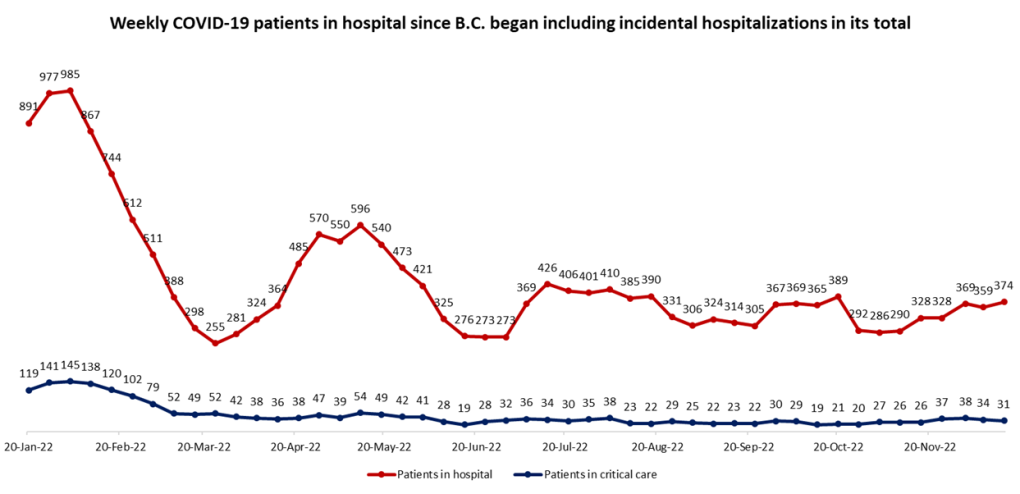Number hospitalized with COVID-19 in B.C. hits highest level since October
 Courtesy: Shutterstock.
Courtesy: Shutterstock.
The number of patients with COVID-19 in B.C. hospitals rose slightly this week to 374, the highest level seen in the province since Oct. 20.
The hospitalized population with COVID remains lower than it was at various points over the summer, however, despite surging respiratory illness that has strained pediatric emergency rooms across B.C.
 This graph shows the number of people in hospital with COVID-19 on Thursdays since B.C. switched to a "hospital census" model for counting them in January. (CTV)
This graph shows the number of people in hospital with COVID-19 on Thursdays since B.C. switched to a "hospital census" model for counting them in January. (CTV)
Current hospitalization totals include both those who have serious cases of COVID-19 requiring medical care and those who are admitted to hospital for other reasons and test positive for the coronavirus incidentally.
Health officials estimate that between 40 and 50 per cent of people hospitalized with COVID-19 at any given time in B.C. are there because of the disease, while the rest are incidental cases.
Since the province began counting hospitalizations this way in January, there have been as many as 985 and as few as 255 patients in hospital on Thursdays.
CASES AND WASTEWATER
The slight rise in the hospital census comes alongside modest increases in official case counts and a slowly increasing trend in the concentration of the SARS-CoV-2 virus in Metro Vancouver wastewater.
As of Thursday, viral concentrations had been rising at all five wastewater treatment plants in the region for at least the last six epidemiological weeks, up to the week of Dec. 4 through 10.
Similarly, the B.C. Centre for Disease Control reported Thursday that it had detected 659 new COVID-19 infections through lab-based testing during the week ending Dec. 10. That's 120 more than the 539 reported during the preceding week, an increase of about 22 per cent.
The official case counts the BCCDC releases each week include only those who test positive on a PCR test for the first time. Reinfections are excluded, and the province does not track the results of at-home rapid antigen tests, which are the only type of test available to the vast majority of British Columbians.
Because of these considerations, experts have estimated that the official weekly case count is likely off by roughly 100-fold.
RESPIRATORY ILLNESS AND VACCINATION
While COVID-19 continues to contribute to the health-care burden in B.C., it has taken a backseat to other respiratory diseases in recent communications from public health officials.
Last week, after information presented to doctors was leaked to CTV News, health officials acknowledged that six children had died from influenza so far this season, and promised to include data on mortality in weekly respiratory updates going forward.
As of Thursday afternoon, the "key messages" document that the BCCDC releases weekly – and which included the flu death information last week – had not been updated yet this week.
Nor had data on community visits for respiratory illness, which the BCCDC compiles weekly from doctors' billing records. For weeks, that data has shown a rise in people visiting doctors for respiratory symptoms, but visits specifically coded by doctors as COVID-related have remained fairly steady.
Last week, the province launched an immunization "blitz" aimed at improving flu vaccination rates among young people. The Ministry of Health said Monday that 77,532 shots were administered between Dec. 5 and Dec 11, and that immunization rates had risen from 21.2 per cent to 26.3 per cent among kids under age five, from 19.5 per cent to 22.6 per cent among kids five to 12, and from 14.6 per cent to 16.9 per cent among teens.
For COVID, overall vaccination rates are considerably higher, but uptake of the latest round of boosters has been comparable among children.
Province-wide, just 17 per cent of children under age five have received a first dose of a COVID-19 vaccine, and only eight per cent have received two doses.
COVID vaccines only became available for this youngest age group over the summer.
Among children ages five to 11, 52 per cent have had one shot, 41 per cent have had two, and only 17 per cent have had a booster.
Health Canada approved COVID vaccines for children five to 11 in late 2021.
Among those ages 12 to 17, 83 per cent have received one shot, 79 per cent have had two, 37 have received a booster and 12 per cent have had a second booster, according to data from the BCCDC.
During the week of Dec. 4 through 10, the province administered a total of 60,271 new doses of COVID-19 vaccine. That's the lowest weekly total seen in B.C. since September, which was before the fall booster campaign began.
CTVNews.ca Top Stories

Biden gives life in prison to 37 of 40 federal death row inmates before Trump can resume executions
U.S. President Joe Biden announced on Monday that he is commuting the sentences of 37 of the 40 people on federal death row, converting their punishments to life imprisonment just weeks before president-elect Donald Trump, an outspoken proponent of expanding capital punishment, takes office.
LIVE UPDATES Toronto weather: Advisories in effect ahead of 'significant' Monday snowfall
Holiday travellers and commuters could be in for a messy drive on Monday morning as a significant round of snowfall moves into the region. Here are live updates on the situation in Toronto.
The rent-a-friend industry is booming among Canada's Chinese diaspora
Dozens of people are offering rent-a-friend services on Xiaohongshu, a social media platform also known as Little Red Book or China's Instagram, in cities including Vancouver, Calgary and Toronto.
Nissan and Honda to attempt a merger that would create the world's No. 3 automaker
Japanese automakers Honda and Nissan have announced plans to work toward a merger that would form the world's third-largest automaker by sales, as the industry undergoes dramatic changes in its transition away from fossil fuels.
Green Party's Elizabeth May reflects on unprecedented week in Canadian politics
Elizabeth May says in all her years on Parliament Hill she has never seen anything like the last week in Canadian politics.
Nordstrom agrees to US$6.25B buyout deal from founding family
Nordstrom said on Monday it would be acquired by its founding family and Mexican retailer El Puerto de Liverpool in an all-cash deal valuing the department store chain at about US$6.25 billion.
opinion Christmas movies for people who don't like Christmas movies
The holidays can bring up a whole gamut of emotions, not just love and goodwill. So CTV film critic Richard Crouse offers up a list of Christmas movies for people who might not enjoy traditional Christmas movies.
Trump suggests the U.S. should take back the Panama Canal. Could they do that?
Donald Trump suggested Sunday that his new administration could try to regain control of the Panama Canal that the United States 'foolishly' ceded to its Central American ally, contending that shippers are charged 'ridiculous' fees to pass through the vital transportation channel linking the Atlantic and Pacific Oceans.
Man handed 5th distracted driving charge for using cellphone on Hwy. 417 in Ottawa
An Ottawa driver was charged for using a cellphone behind the wheel on Sunday, the fifth time he has faced distracted driving charges.

































